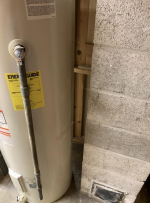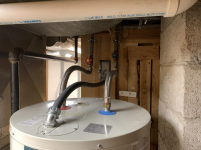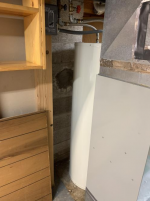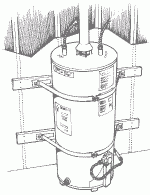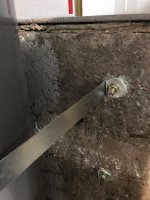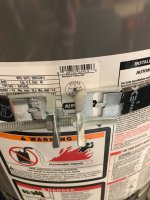Trying to prep a home for sale and my realtor tells me we need "earthquake straps" on the water heater. I'm like [huh] there are no and never have been earthquakes at this location. I inquire about grandfathered in etc, no exceptions. I look up the code and you have to have two straps, two points of contract for each. You can't have more than 4" of gap either between the unit and wall. Obviously I spend a minute being mad at whomever invented this code and still wish them Ebola, black widow bites head to toe, and rot in the fires of eternal damnation. But I still have to figure out how to solve this...
I'm including some pictures. My first thought is to P&L 2x6's on both sides of the chimney facing it and wrap the strap around and anchor into them at two locations (two sets of 2x6's). Furring out from it is necessary due to distance. I'm not so sure how it'd hold up to concrete screws so that seems a bit risky. Alternatives are shooting plate into concrete to build a wall behind it but then that has to be furred out as well. Re-frame the whole closet to the master bedroom sound like a nightmare, to get the plate to line up on bottom with no furring. There's very little room around it as well towards the furnace. And of course the option to pay a plumber a huge amount of money to move the entire unit so it can be strapped to a wall for no [censored] [censored] [censored] [censored] reason at all. This is all because 300 miles on the other side of a mountain range and tectonic plate there was an earth quake 100 years ago : . This has to get done because it's a sale that will provide the necessary money for my father's care at a memory care residency (been a long road to even get to this point).
. This has to get done because it's a sale that will provide the necessary money for my father's care at a memory care residency (been a long road to even get to this point).
I'm including some pictures. My first thought is to P&L 2x6's on both sides of the chimney facing it and wrap the strap around and anchor into them at two locations (two sets of 2x6's). Furring out from it is necessary due to distance. I'm not so sure how it'd hold up to concrete screws so that seems a bit risky. Alternatives are shooting plate into concrete to build a wall behind it but then that has to be furred out as well. Re-frame the whole closet to the master bedroom sound like a nightmare, to get the plate to line up on bottom with no furring. There's very little room around it as well towards the furnace. And of course the option to pay a plumber a huge amount of money to move the entire unit so it can be strapped to a wall for no [censored] [censored] [censored] [censored] reason at all. This is all because 300 miles on the other side of a mountain range and tectonic plate there was an earth quake 100 years ago :

